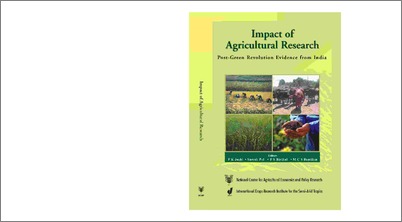Impact of Agricultural Research: Post-Green Revolution Evidence from India
Abstract
Agricultural research systems all over the world are acclaimed for their significant contributions to food and nutritional security and poverty alleviation. There is empirical evidence of agricultural growth induced by the Green Revolution technologies having benefited the rural and urban poor through reduction in food prices. Although the impact in terms of poverty reduction has multiplied over the years and spread geographically, there is a need to accelerate these impacts in order to improve the livelihoods of the poorest of the poor and to achieve the Millennium Development Goals (MDGs). India is one of the success stories of the Green Revolution. The Indian experience has convincingly proven that appropriate technologies, supported by facilitating public policies and efficient institutions, can transform smallholder agriculture. Umpteen studies have revealed that these three major sources of agricultural growth are highly interactive and dynamic. They evolve in the contextual realities of an agricultural sector and respond to internal and external developmental changes. However, the question now arises as to how modern technologies and institutions interact in the era of privatization and globalization. The ways and means of harmonizing national agricultural policies with international agreements on trade, exchange of resources, property rights, etc, should be evolved for accelerating the flow of technologies to millions of smallholders. Research impacts are not uniform across different sub-sectors of agriculture owing to differences in the degree of market orientation, efficiency of input and service delivery systems, dominance of smallholders, etc. Sector-specific institutional and policy constraints need to be understood and addressed in order to enhance the flow of technology to farmers and to realize large-scale impacts. Similarly, greater attention should be paid to understanding institutional constraints to the dissemination and adoption of technologies promoting sustainable use of natural resources. The same holds true for the technologies for livestock, horticulture and agro-processing which are capital intensive. The Indian Council of Agricultural Research (ICAR) and the International Crops Research Institute for the Semi-Arid Tropics (ICRISAT) have a long tradition of research partnership in agricultural science. Both accord high priority to tracking adoption of technologies by farmers, assessing their impacts and learning from this experience. Social scientists from both the organizations have allocated considerable resources towards this work and brought out a number of publications. This volume is an addition to this series, wherein both macroand micro-level studies pertaining to different sectors of Indian agriculture have been covered in detail, with evidence mostly stemming from the post-Green Revolution period

